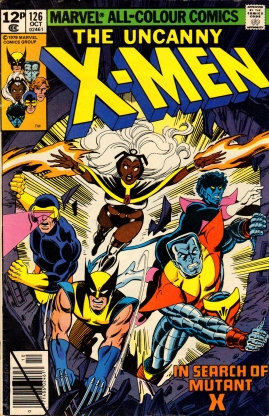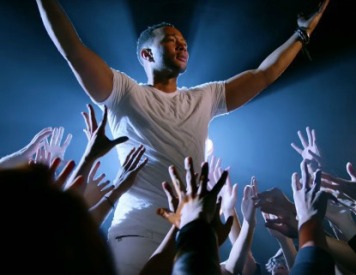New Myths, Same Old Virtues
 Note: This post first appeared as a special article in a February issue of Assumption College’s student newspaper Le Provocateur. With the imminent arrival of Infinity War in theaters this Thursday, I decided to re-print it here.
Note: This post first appeared as a special article in a February issue of Assumption College’s student newspaper Le Provocateur. With the imminent arrival of Infinity War in theaters this Thursday, I decided to re-print it here.
I wanted to offer a witness, a side of my personal story that I don’t often get to tell. The story begins back in my childhood, but the love that was born there became a bigger part of my life over time. I don’t think I realized how important it really was to me until I was an adult. And now it is something that has become a part of my life every single day.
I’m speaking, of course, about my love for superheroes.
The image that began the journey was the cover of a comic book: Uncanny X-Men #126. It was a splash shot of colorful characters bursting through a hole in the wall and towards the viewer. The motif was a pretty standard one back in the day and it captured my attention: Who were these people? What were their powers? Where were they going in such a hurry? So began the love affair that has only grown over the years.
My comic book collecting had actually started earlier, back in 1977 with Star Wars #7. Episode 4 had just come out (we just called it “Star Wars,” of course) and I was thrilled that there were more stories involving these characters. But after a few years of reading Star Wars, I wanted to learn more about the superheroes that dominated the comics rack in the local hobby store. It started with the X-Men, but I quickly devoured everything I could get my hands on. I picked up the pace of my collecting in high school, slowed down in college and grad school, and then stopped altogether when it became way too expensive. Now I do all my reading thanks to public libraries and the Marvel Unlimited online service where, for six bucks a month, I can read all the Marvel comics I want. I highly recommend it.
However, the point of my story is not about comic collecting or even comic reading. It is very specifically about superheroes and why they became so important to me. American comic books have created new myths in the 20th century. Just like the stories of the gods of old, there are noble truths to be unveiled and poor choices to be condemned. The stories are constantly revived to respond to new times and new cultural circumstances.
Why do we need new stories of new gods? I think there are a couple reasons for this. The first is that these stories often fill the place that our old gods used to occupy. In a world that has maintained a lively desire for the spiritual while denigrating the religious traditions that gave birth to the Western world, the image of the superhero and the virtues of heroism on display serve a quasi-religious purpose in teaching moral truth. The second reason is, for those who already recognize the role of the divine in the world and in their lives, these stories of god-like beings can often give us new ways of understanding important truths about a God we already know.
For example, when Ben Parker tells his teenage nephew Peter that “with great power comes great responsibility,” he wasn’t only providing a maxim to inspire 50 years of motivation for the most popular superhero in the world; he was also re-telling the words of Jesus in the parable of the faithful servants: “Much will be required of the person entrusted with much, and still more will be demanded of the person entrusted with more” (Luke 12:48). Spider-Man needs to live up to his call, and so do I.
For me personally, no one is better at conveying the connection between superheroic motivation and my own desire to be virtuous than Captain America. In my life, I hold Jesus to be the most important guide for living my life…followed closely by Captain America. The examples I could give from his life and words are many, but I’ll just share what is widely considered the most famous (it is quoted in abbreviated form by Sharon Carter in the movie Captain America: Civil War). This version was written by J. Michael Straczynski in Amazing Spider-Man #537:
Doesn’t matter what the press says. Doesn’t matter what the politicians or the mobs say. Doesn’t matter if the whole country decides that something wrong is something right. This nation was founded on one principle above all else: The requirement that we stand up for what we believe, no matter the odds or the consequences. When the mob and the press and the whole world tell you to move, your job is to plant yourself like a tree beside the river of truth, and tell the whole world: “No, you move.”
In fairness, Cap is quoting Mark Twain (and the original comic states this explicitly). Also, it is worth noting that you can take this exact same quote and use it to defend any number of otherwise contrary propositions. But I really think that the context here matters: it’s coming from Captain America, a paragon of virtue, who always stands up for the best of what America can be, rather than any specific instantiation of it. This can be understood in a broader context than the original quote in order to inspire one to always live according to the Truth, beyond any ideological constraint (see John 14:6).
Other than being consistent money-makers, there is a deeper reason that superhero movies now come out every couple of months with no sign of going away (there are several dozen superhero films and TV projects already greenlit through the year 2022). Superhero stories give us new ways of looking at our contemporary circumstances and re-kindling ideals to fight the problems of our world. They give us a safe, entertaining environment to look at conflicting perspectives on how to fight injustice and how they can be resolved by striving to be our best selves. Most especially, these stories give us hope that righteousness will triumph, evil will fail, and the fight necessary to secure victory for truth is always worth it, even when it comes at a high cost. In other words, these stories inspire reflection on the theological virtue of hope:
The virtue of hope responds to the aspiration to happiness which God has placed in the heart of every person; it takes up the hopes that inspire our activities and purifies them so as to order them to the Kingdom of heaven; it keeps one from discouragement; it sustains us during times of abandonment; it opens up our hearts in expectation of eternal beatitude. Buoyed up by hope, one is preserved from selfishness and led to the happiness that flows from charity. (Catechism of the Catholic Church 1818)
The heroic exploits of superheroes inspire reflection on the life of virtue. Just like the myths of ancient cultures, these stories provide a narrative way of teaching moral truth. The grandiose nature of the stories appeals to our longings for a bigger, better world than the one we deal with in our everyday lives. For all these reasons, we need superhero stories in our world. We should all be thankful that they are so easy to come by. I know I am.

